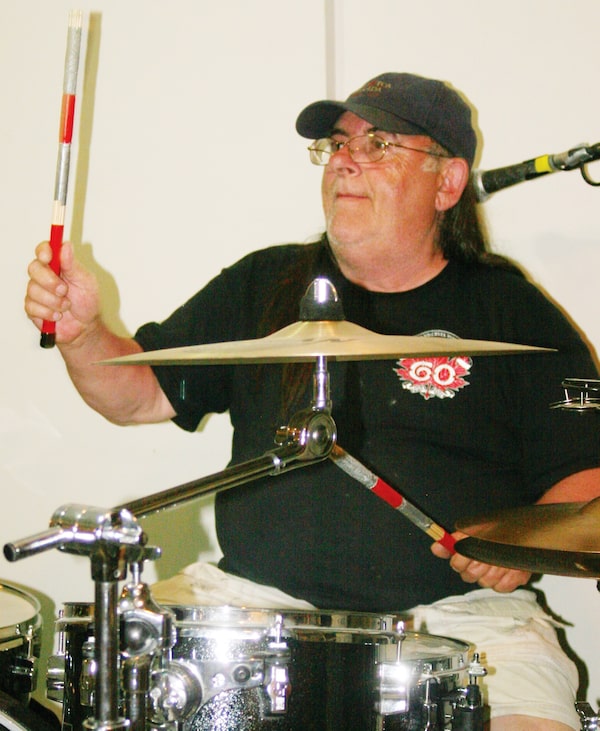
Randy Begg, drummer and co-founder of Canadian band Wednesday, is shown at a rehearsal in 2017.Linda Begg/The Canadian Press
As the drummer of 1970s Canadian pop-rock band Wednesday, Randy Begg may have sat near the back of the stage, but friends say his energy and passion were always front and centre in life.
Whether it was talking about music, encouraging his friends to make it, or delivering a smashing performance of his own, they say the Oshawa, Ont.-born musician wore his creative spirit on his sleeve.
Begg had a heart attack and died on Dec. 20 in Belleville, Ont., according to band co-founder Paul Andrew Smith. He was 71.
He leaves behind a legacy as co-creator of Wednesday, whose hit cover of Last Kiss preceded the one recorded by Pearl Jam. Wednesday also turned out a number of popular singles during a vibrant time for Canada’s music industry.
Smith called his band mate “outwardly friendly and dedicated to his drumming.”
“He was the glue that connected the band,” he added.
Begg’s music career hit its stride in his teens after a chance encounter that involved Smith’s parents. The Smith family had moved from England to Oshawa just one day earlier when his mom and dad were walking down the sidewalk and spotted a group of teens lugging a drum kit.
One of them was Begg, who immediately took them up on the suggestion that he meet their son Paul, who too was a musician.
He and Smith instantly hit it off. Over the summer of 1967, they played in parks and drop-in centres, eventually recruiting others to form Wednesday.
“We always kept thinking: What if my parents hadn’t gone [out] that particular minute? What if Randy wasn’t walking along the street at that particular time?” Smith said.
Within a few years, Wednesday was building a reputation in the burgeoning Toronto music scene with Begg leaning on his good sense of humour to create an entertaining show.
Peter Genrick remembers seeing the band in concert sometime before he was hired as their lighting director and being struck by how much attention Begg could draw from behind his drum set.
Aside from “beautiful harmonies” with band mate Mike O’Neil, he said one of the standout moments was when Begg closed out a drum solo by climbing on top of his timpani kettle drums and sending them “flying all over the place.”
“I was like, ‘Wow this guy is a bit of a loose cannon,’ ” he said. “He scared the daylights out of me.”
Begg knew how to create a moment – Smith said his band mate would often cover his face in clown makeup to elevate the fun of the show.
Wednesday rode their reputation to a chart hit in 1974 with Last Kiss, a song originally recorded by Wayne Cochran. Their cover peaked at No. 34 on the Billboard Hot 100 more than two decades before Pearl Jam’s version would score them a hit single too.
The band landed several more hits, including a remake of Mark Dinning’s Teen Angel and Elton John’s I’ve Been Loving You, but as the decade stretched on they struggled with direction.
Executives at their record label encouraged them to tweak their name to Wenzday, an odd decision for a band whose name was already established. Their 1977 album Nearly Made It carried the new spelling.
“They may have been trying to give us a bit more of an edge … a bit more of a dynamic look,” suggested Smith.
“But I’m not sure that it was a good idea.”
A few years later, Wenzday would dissolve though Begg kept drumming in other bands that included the Scott Street Band and Lockerbie. He reunited with members of Wednesday on at least two instances in the decades that followed.
Begg most recently took part in this year’s Christmas stage show at the Stirling Festival Theatre in Stirling, Ont., one of many shows he participated in with the theatre.
His love for music is captured in a line he wrote for Wednesday’s song The Show Will Never End, suggested Smith. The track, which Smith composed, closed out their 1976 album Loving You Baby, and summed up how he felt about life on the stage.
“When the music is over, please don’t walk away,” the song goes. “‘Cause, the show will never end for me, until my dying day.”
Smith hopes to re-record the song with a new verse in response to his friend’s words, telling him that even after death, “those songs will always play for us, and light another day.”